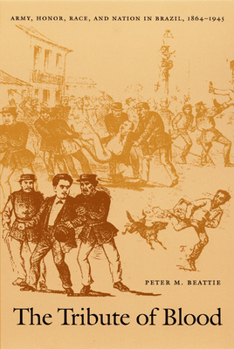The Tribute of Blood: Army, Honor, Race, and Nation in Brazil, 1864-1945 (Latin America Otherwise)
Select Format
Select Condition 
Book Overview
In The Tribute of Blood Peter M. Beattie analyzes the transformation of army recruitment and service in Brazil between 1864 and 1945, using this history of common soldiers to examine nation building and the social history of Latin America's largest nation. Tracing the army's reliance on coercive recruitment to fill its lower ranks, Beattie shows how enlisted service became associated with criminality, perversion, and dishonor, as nineteenth- and early-twentieth-century Brazilian officials rounded up the "dishonorable" poor--including petty criminals, vagrants, and "sodomites"--and forced them to serve as soldiers.
Beattie looks through sociological, anthropological, and historical lenses to analyze archival sources such as court-martial cases, parliamentary debates, published reports, and the memoirs and correspondence of soldiers and officers. Combining these materials with a colorful array of less traditional sources--such as song lyrics, slang, grammatical evidence, and tattoo analysis--he reveals how the need to reform military recruitment with a conscription lottery became increasingly apparent in the wake of the Paraguayan War of 1865-1870 and again during World War I. Because this crucial reform required more than changing the army's institutional roles and the conditions of service, The Tribute of Blood is ultimately the story of how entrenched conceptions of manhood, honor, race, citizenship, and nation were transformed throughout Brazil.
Those interested in social, military, and South American history, state building and national identity, and the sociology of the poor will be enriched by this pathbreaking study.
Beattie looks through sociological, anthropological, and historical lenses to analyze archival sources such as court-martial cases, parliamentary debates, published reports, and the memoirs and correspondence of soldiers and officers. Combining these materials with a colorful array of less traditional sources--such as song lyrics, slang, grammatical evidence, and tattoo analysis--he reveals how the need to reform military recruitment with a conscription lottery became increasingly apparent in the wake of the Paraguayan War of 1865-1870 and again during World War I. Because this crucial reform required more than changing the army's institutional roles and the conditions of service, The Tribute of Blood is ultimately the story of how entrenched conceptions of manhood, honor, race, citizenship, and nation were transformed throughout Brazil.
Those interested in social, military, and South American history, state building and national identity, and the sociology of the poor will be enriched by this pathbreaking study.
Format:Paperback
Language:English
ISBN:0822327430
ISBN13:9780822327431
Release Date:September 2001
Publisher:Duke University Press
Length:416 Pages
Weight:1.40 lbs.
Dimensions:1.1" x 6.2" x 9.1"
Customer Reviews
1 rating
Drafting the Dregs Into the Nation
Published by Thriftbooks.com User , 19 years ago
This well-researched book breaks new ground in Brazil's military and social history. It explores the paradox of using the army to build national identity with forced enlistment from marginal social groups---including convicts, vagrants and homosexuals. The army became a feared fighting force, but mostly by crushing internal rebels and smaller neighbors like Paraguay, not first-rate opponents. Brazilians came to dread military service, avoiding it whenever possible, and eventually a less arbitrary recruitment system emerged. Beattie paints a convincing picture of the evolution of a major institution in modern Brazil. His broad approach to evidence, deploying an impressive array of conventional and innovative sources, further displays the potential of this new military history. T. Whigham's "I Die With My Country" and "The Paraguayan War" have important new material on the War of the Triple Alliance. The army's bloody role in suppressing dissent is covered, often brilliantly, in R. Levine, "Vale of Tears," T. Diacon, "Millenarian Vision, Capitalist Reality," and especially E. da Cunha, "Rebellion in the Backlands." S. Caulfield, "In Defense of Honor" is another fresh view of Brazilian society in the same era, but Beattie really does offer something new.






